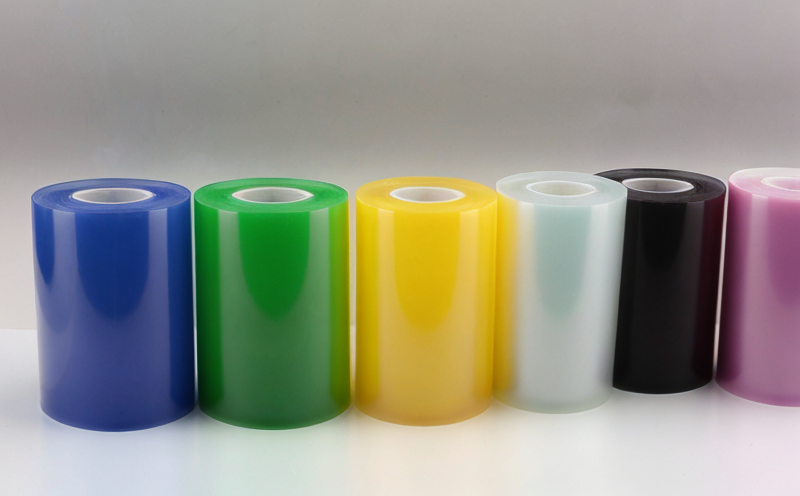NF T54-122 Flexural Strength Testing of Plastic Sheets
The NF T 54-122 standard provides a comprehensive framework for assessing the flexural strength of plastic sheets. This test is particularly important in sectors such as automotive, construction, and packaging where materials need to withstand mechanical stress without failing. The flexural strength indicates how much force can be applied before a plastic sheet breaks or deforms permanently.
The testing procedure involves preparing standard specimens according to the NF T 54-122 specifications. These include dimensions such as thickness, length, and width which must comply with the standards set out in this document. Once prepared, the samples are clamped into a universal testing machine (UTM), where they are subjected to gradually increasing load until failure occurs.
The test setup typically includes a UTM equipped with appropriate fixtures for holding plastic specimens during flexural testing. The choice of fixture depends on the type and thickness of the material being tested. For instance, thin films may require different clamping arrangements compared to thicker sheets or boards. It’s crucial that the specimen remains centered under load throughout the test to ensure accurate measurement.
During the test, strain gauges measure deflections at specific points along the sample length, providing continuous data on how much bending occurs under increasing loads. This information is used alongside force measurements from a load cell integrated into the testing machine. The combination of these variables allows for precise calculation of flexural modulus and ultimate flexural strength.
Flexural strength results are reported in terms of maximum stress experienced by the material before failure along with any other relevant parameters like deflection at yield point or crack initiation location on the specimen surface. Compliance with NF T 54-122 ensures that manufacturers can demonstrate consistent quality across batches, which is essential for maintaining product reliability.
One key advantage of performing this test according to NF T 54-122 lies in its ability to predict potential weaknesses within a particular batch or type of plastic sheet. By identifying these issues early on through rigorous testing processes, companies can take corrective actions such as adjusting production parameters or selecting alternative raw materials.
Another benefit is that it helps establish benchmarks for comparing products from different suppliers or across various stages of development. This comparative analysis enables informed decision-making regarding material selection and process optimization aimed at improving overall performance metrics like durability, impact resistance, and flexibility.
| Test Parameter | Description |
|---|---|
| Specimen dimensions | Thickness, length, width specified by NF T 54-122. |
| Load application rate | Uniformly increasing load at a controlled speed. |
| Strain gauge positioning | Placement on sample to monitor deflection accurately. |
| Deflection measurement | Determination of bending deformation during loading. |
| Force measurement | Capturing the applied load using a load cell. |
In summary, NF T 54-122 flexural strength testing offers valuable insights into the mechanical properties of plastic sheets, ensuring high-quality products that meet stringent industry standards. This service plays an integral role in quality assurance programs by helping businesses identify areas for improvement and maintain consistent product performance over time.
Scope and Methodology
The scope of NF T 54-122 flexural strength testing encompasses various types of plastic sheets, including those used in packaging, construction materials, and automotive components. This standardized approach ensures that all tested samples are subjected to identical conditions, making comparisons between different batches or suppliers more reliable.
- Material Types: Polyethylene (PE), polypropylene (PP), polycarbonate (PC), acrylonitrile butadiene styrene (ABS).
- Test Conditions: Ambient temperature and humidity levels adhering to NF T 54-122 guidelines.
The methodology involves precise specimen preparation, proper mounting in the testing machine, application of incremental loads until failure occurs, and careful recording of all relevant data points. Compliance with these procedures guarantees accurate results that can be used confidently for quality control purposes.
Industry Applications
The NF T 54-122 flexural strength testing finds extensive application in multiple industries where plastic sheets play a crucial role:
- Automotive Sector: Assessing durability of bumpers, interior trim components.
- Construction Industry: Evaluating suitability of roof membranes, insulation boards.
- Packaging Sector: Ensuring robustness of shrink wrap films, food packaging trays.
A table highlighting typical applications further illustrates the versatility of this testing methodology across diverse sectors:
| Sector | Application Example |
|---|---|
| Automotive | Bumper reinforcement plates, dashboard inserts. |
| Construction | Roofing felt, wallboard backing sheets. |
| Packaging | Shrink film containers, pallet wrap films. |
International Acceptance and Recognition
NF T 54-122 has gained widespread acceptance among laboratories worldwide due to its rigorous methodology and consistent results. Many international organizations recognize compliance with this standard as evidence of high-quality testing practices:
- ASTM International: ASTM D790, which covers similar principles for plastic specimens.
- ISO Standards: ISO 178, covering flexural properties of plastics.
Laboratories accredited to perform NF T 54-122 testing can expect increased credibility in their reports and enhanced trust from clients seeking reliable quality assurance data. This global recognition underscores the importance of adhering strictly to these standards when conducting flexural strength tests on plastic sheets.





